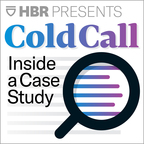
Cold Call
Summary: Cold Call distills Harvard Business School's legendary case studies into podcast form. Hosted by Brian Kenny, the podcast airs every two weeks and features Harvard Business School faculty discussing cases they've written and the lessons they impart.
- Visit Website
- RSS
- Artist: HBR Presents / Brian Kenny
- Copyright: Copyright 2024 President and Fellows of Harvard College
Podcasts:
Melvin Carter, the mayor of Saint Paul, Minnesota, swept into office in 2018, promising to improve equity. In his campaign, he had spoken from experience about what it felt like to be pulled over by police as a Black man. He wanted to create a new public safety framework that would be rooted in community. But then the COVID-19 pandemic wiped out much of the city’s budget and the May 2020 killing of George Floyd by a police officer in neighboring Minneapolis sparked calls to defund the police. How would Mayor Carter make these changes happen?
For family social workers, coping with the hardships of children and parents is part of the job. But that can cause a lot of stress. Is it possible to use non-cash rewards and recognition to improve social workers’ well-being? Ashley Whillans describes the experience of Chief Executive Michael Sanders’ experience at the What Works Centre for Children’s Social Care.
Unilever’s Dove soap became a brand with purpose when it launched the “Campaign for Real Beauty” to combat media-driven stereotypes of female beauty. But now Dove is facing criticism about its other brands that contradict the Dove campaign, and struggling to determine the best allocation of funds between advertising and the educational programs that deliver social impact. Can Dove maintain both its market position and social impact in the future?
As the transportation landscape evolves, can Uber adapt its business model to be successful in unique regional markets around the world? Alexander MacKay describes Uber’s global market strategy and responses by regulators and local competitors.
From Weight Watchers to bariatric surgery, innovations for combatting obesity abound. But which will do the most good for society and yield the best business results? Harvard Business School professor Regina Herzlinger discusses how to evaluate health care innovations aimed at providing solutions for obesity in her case, “Fighting the Battle of the Bulge – Evaluating Innovations in Morbid Obesity Treatment.”
Entrepreneur Christy Jones is trying to create a new venture to help women preserve their eggs and postpone motherhood. But what would an egg-freezing service sell – and to whom?
Nehemiah Manufacturing turned a social mission to hire convicted felons into a competitive advantage, with decreased turnover and higher staff loyalty. Harvard Business School professor Michael Chu discusses the challenges and opportunities of combining profit with social impact in his case, “Nehemiah Mfg. Co.: Providing a Second Chance.”
Making voting more accessible through technology could allow more people to take part in elections. But it also poses critical downsides, if the product fails or there are security failures. Harvard Business School professor Mitchell Weiss debates the risks, rewards, and business models for mobile voting in his case study on “Voatz.”
As we celebrate the five-year anniversary of Cold Call, we welcome a special guest, Harvard Business School Dean Nitin Nohria to discuss the classic case, “Rob Parson at Morgan Stanley.” The case poses a complex dilemma: should Morgan Stanley promote a high performer who lacks interpersonal skills and brushes off company values? More subtly, the case also encourages reflection about the accountability of managers in an employee’s performance.
Simón Cohen, founder of Henco Logistics, transformed a small Mexican logistics company into a major player within the industry. Cohen credits the firm’s focus on employee happiness as the key ingredient to its success -- an approach he developed following a personal crisis. But can that approach endure through Henco’s rapid growth, leadership transition, and changing employee expectations?
C16 Biosciences wants to replace palm oil, a major contributor to deforestation and climate change, with a lab-grown substitute. Should the synthetic biology startup start small in the personal care market or dive into booming lab-grown food market?
Singapore officials added a nationwide, Bluetooth-based contact tracing program called TraceTogether to their suite of Covid-19-fighting strategies, which already included human-led tracing. The new digital program’s success would rely on mitigating privacy issues. Would Singaporeans adopt TraceTogether? As Singapore’s government opened up the technology to the world, would you? Harvard Business School professor Mitch Weiss discusses his new case, “TraceTogether.”
The digital-first, direct-to-consumer beauty brand Glossier considers marketing strategies that move away from organic community support and toward influencer marketing and paid media. Harvard Business School professor Jill Avery discusses the debate in her case, “Glossier: Co-Creating a Cult Brand with a Digital Community.”
After a highly publicized act of racial discrimination by a Starbucks employee against two African American men in one of its stores in 2018, the company closed its 8,000 U.S. coffee shops for a day of unconscious bias training. The company also revised store policies and employee training practices. Harvard Business School professors Francesca Gino and Katherine Coffman discuss what we can learn about unconscious bias in corporate culture from Starbucks’ reaction to that incident in their case, “Starbucks: Reaffirming Commitment to the Third Place Ideal.”
Harvard Business School professor Len Schlesinger and RSE Ventures Co-founder Matt Higgins discuss why direct-to-consumer channel businesses, like teledentistry company SmileDirectClub, must implement a strategy that moves them beyond DTC in order to thrive – and how to make that change. This episode is based on the Harvard Business School case, “SmileDirectClub: Better is Better.”